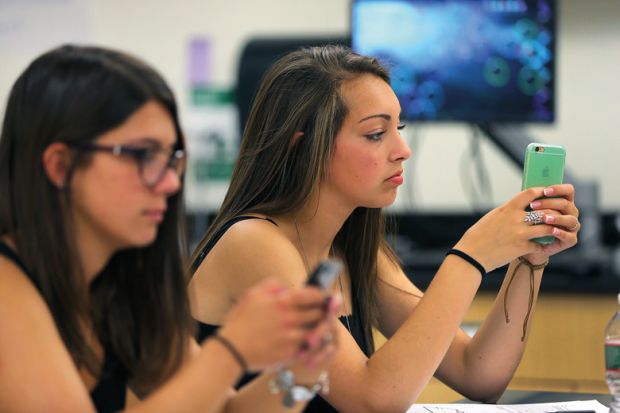Academics frustrated by students who endlessly check their Facebook messages or Instagram likes during lectures might be inclined to blame boredom or downright rudeness on the part of those glued to their smartphones or laptops.
But although this explains some of the digital distraction that occurs in university classes, new research suggests that compulsive social media use might be the result of students struggling to settle in to campus life and experiencing “Fomo” – the fear of missing out on others’ experiences.
Nearly 300 social science undergraduates from an Israeli university were quizzed on how much they used social media sites during lectures, their level of anxiety about being out of touch with events, and whether they were enjoying university or felt homesick.
Students who reported feeling negative emotions also had higher levels of Fomo, which led to their using social media during class, explained author Dorit Alt, a senior lecturer in education at Kinneret College on the Sea of Galilee.
One plausible explanation was that “students, who suffer emotional maladjustment and depression, desire to stay continually connected with what others are doing in order to fill their emotional ‘void’”, she told Times Higher Education.
One practical implication was that universities need to provide “supporting interventions” for students experiencing loneliness and anxiety, she added.
John Sharp, a professor of education at Leeds Beckett University who has been studying student boredom and attention for the past four years, said that the findings from the study – “Students’ wellbeing, fear of missing out, and social media engagement for leisure in higher education learning environments”, published in Current Psychology – were “entirely plausible”.
There was a tendency among lecturers to dismiss distraction during lectures as “just students not being attentive”, he said.
Universities focused on providing social and educational support for students, he said, but emotions were not always given the same priority. There was sometimes a lack of emphasis on “everyday” negative emotions that were not full-blown depression or anxiety, he added. “Students are not good at recognising their own emotional states.”
The rise in social media use and popular interest in Fomo has attracted academic attention in recent years.
In 2013, researchers created a set of questions to measure the phenomenon, which is used in Dr Alt’s study, and discovered that the trait – defined as a “pervasive apprehension that others might be having rewarding experiences from which one is absent” – was associated with lower mood and life satisfaction, and linked to higher levels of social media use.
Register to continue
Why register?
- Registration is free and only takes a moment
- Once registered, you can read 3 articles a month
- Sign up for our newsletter
Subscribe
Or subscribe for unlimited access to:
- Unlimited access to news, views, insights & reviews
- Digital editions
- Digital access to THE’s university and college rankings analysis
Already registered or a current subscriber? Login






